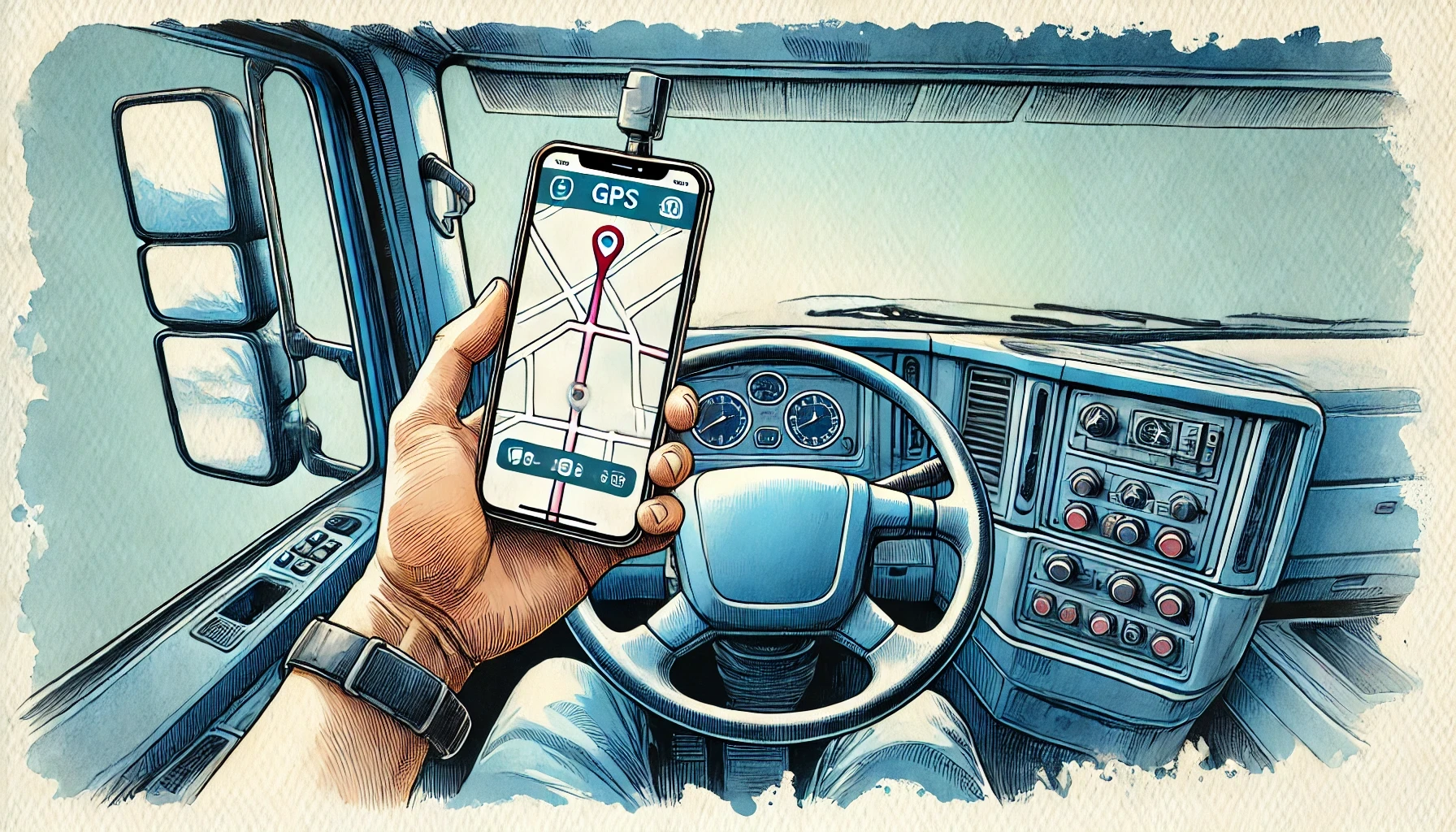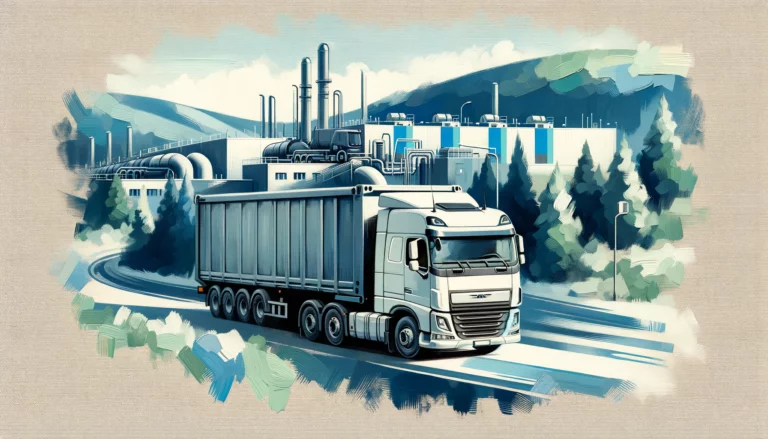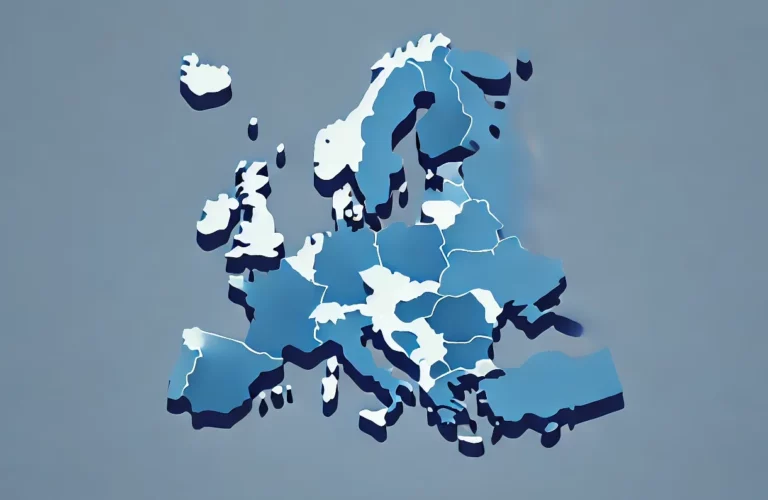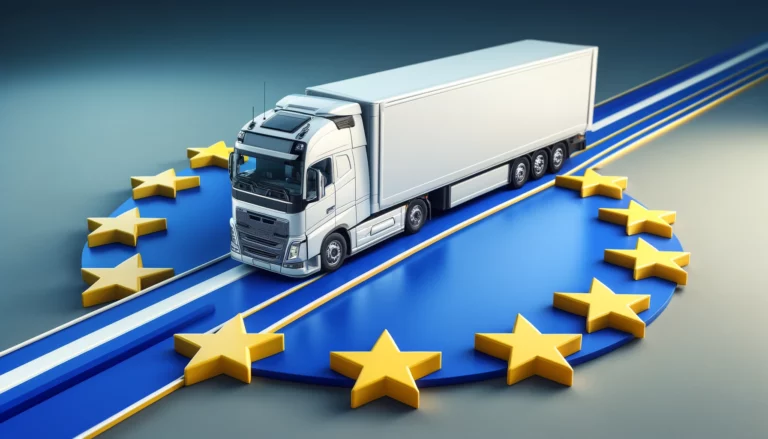Why GPS tracking is essential for cross-border waste transport?
The transport of waste across borders is a highly regulated industry. With increasing environmental concerns, illegal waste dumping, and rising logistics costs, companies must adopt innovative solutions to stay compliant and efficient. One of the most effective tools in modern waste transport is GPS tracking. It ensures real-time monitoring, regulatory compliance, and enhanced security. In this article, we explore why GPS tracking is essential for cross-border waste transport, focusing on European regulations, industry challenges, and key benefits.
The growing need for GPS tracking in waste transport
The European Union (EU) has seen a 72% increase in waste exports to non-EU countries since 2004. By 2023, waste exports reached 35 million tons per year. This surge has led to tighter regulations, with authorities aiming to prevent illegal waste shipments and reduce environmental risks.
To address these concerns, the new Waste Shipments Regulation (enforced May 20, 2024) introduced stricter rules on waste exports. This regulation enhances traceability through digitalized procedures, making GPS tracking an essential tool for compliance.
Ensuring compliance with international regulations
Cross-border waste transport is governed by strict regulations, including:
- Regulation on Waste Shipments (Regulation (EC) No 2024/1157) – Replaced the earlier Regulation (EC) 1013/2006, although some of its provisions are still in effect until 21 May 2026. This document ensures waste moves legally and sustainably.
- Basel Convention – Controls transboundary hazardous waste movements.
GPS tracking helps waste transporters meet these legal requirements by providing real-time shipment data. Companies using GPS monitoring avoid fines, shipment delays, or legal actions for non-compliance.
Back in 2018 the LIFE SWEAP (Shipments of Waste Enforcement Actions Project) was initiated to enhance the enforcement of waste shipment regulations across Europe. A key component of this project involved the trial and assessment of GPS tracking technology to monitor and enforce waste shipments. Seven competent authorities from six countries participated in this trial, including the Czech Customs Administration, Environment Agency (England), and the Environment and Resources Authority (Malta). The trial demonstrated that GPS tracking could provide unique and otherwise unattainable information, significantly benefiting the resolution of complex cases. However, the trial also highlighted challenges such as legal complexities, the need for specialized surveillance, and technical issues that require substantial resources to address.
Preventing illegal dumping and environmental hazards
Illegal waste dumping poses serious environmental risks. In many cases, waste shipments are misrouted or abandoned, causing soil and water contamination. GPS tracking prevents this by:
- Detecting unauthorized route deviations in real-time.
- Triggering alerts if a shipment moves outside designated zones.
- Ensuring waste arrives at approved facilities.
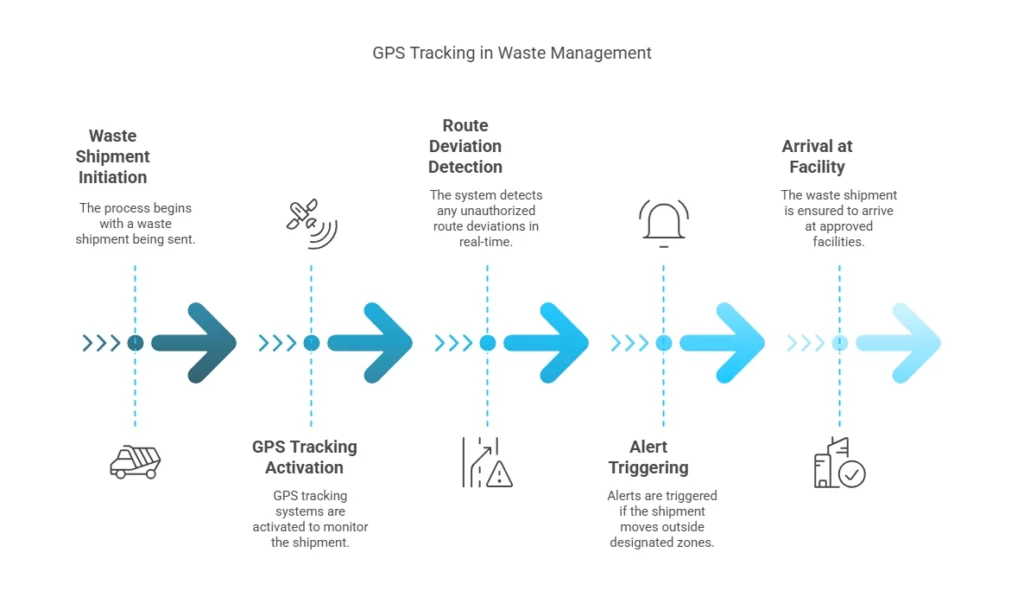
Back in 2019 The Basel Action Network (BAN) conducted a comprehensive two-year study across ten European Union countries, tracking 314 used electronic devices equipped with hidden GPS trackers. The findings revealed that a portion of these devices was illegally exported to countries such as Ghana and Nigeria. This study underscores the challenges in managing electronic waste and highlights the potential of GPS tracking to monitor and prevent illegal e-waste shipments.
Enhancing security and theft prevention
Waste transport isn’t just about compliance—it’s also about protecting valuable or hazardous materials. Theft or unauthorized access to waste loads can lead to:
- Environmental contamination (especially with hazardous waste).
- Financial losses for companies handling waste disposal.
GPS tracking improves security by:
- Providing real-time location updates to prevent theft.
- Detecting unscheduled stops or suspicious route changes.
- Sending alerts to operators for immediate action.
This proactive security approach ensures that hazardous and high-value waste shipments remain protected throughout the journey.
Improving operational efficiency and cost reduction
GPS tracking isn’t just about regulatory compliance—it also boosts operational efficiency.
Key benefits include:
- Optimized route planning, leading to reduced fuel consumption.
- Lower transport costs, with studies showing a potential 20% cost reduction.
- Faster border crossings, thanks to automated tracking updates.
Fleet managers rely on GPS data to plan better routes, avoid traffic, and make waste transport more efficient and cost-effective. Maps by Hogs takes this even further with smart route planning, automatic toll calculations, and easy-to-use fleet management tools—all in one platform. With its real-time tracking system, companies can keep an eye on their vehicles, making sure they follow the right routes and meet all waste transport regulations. The HOGS Navi app lets dispatchers send exact routes straight to drivers, helping them stay on track and reducing mistakes. Plus, the platform offers valuable insights on fuel use, driving habits, and ways to cut costs, making waste transport more efficient and eco-friendly. By using these innovative tools, Maps by Hogs is transforming waste transport, making it easier, safer, and more sustainable.
Enhancing transparency and customer trust
Transparency is key to maintaining trust with clients, regulators, and environmental agencies.
GPS tracking provides:
- Live shipment updates for clients.
- Verifiable records of transport routes for audits.
- Improved documentation for regulatory authorities.
For example, companies that adopt GPS tracking systems often see an increase in customer trust. Clients value clear, real-time updates, which reduce uncertainty and improve business relationships.
The future of GPS tracking in cross-border waste transport
The future of waste transport is increasingly tech-driven. The European GPS tracking market is expected to capture a revenue share of 33.7% by 2037. This rise is fueled by:
- Integration of IoT (Internet of Things) for smarter waste logistics.
- Predictive analytics for better transport planning.
- Stronger regulatory mandates requiring digital tracking.
With these advancements, GPS tracking will continue to shape the waste transport industry, ensuring better compliance, efficiency, and security.
Conclusion
GPS tracking is no longer optional in cross-border waste transport—it’s essential. From regulatory compliance and security to cost savings and transparency, real-time tracking offers unmatched benefits.
With stricter European laws, transport companies must embrace GPS technology to stay compliant and competitive. Those who invest in smart tracking solutions will not only avoid legal risks but also enhance efficiency and build trust with stakeholders. Would you like to integrate GPS tracking into your waste transport operations? Now’s the time to act.

